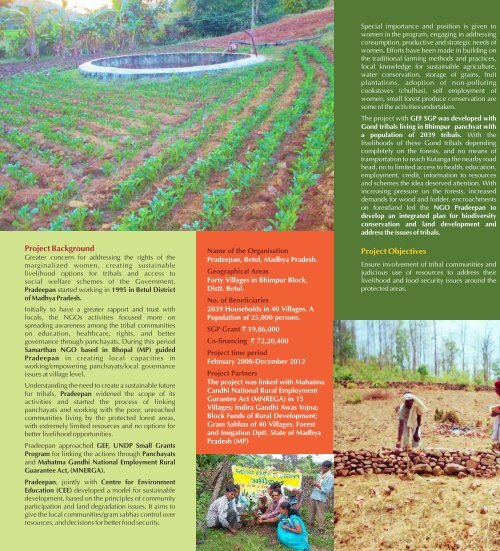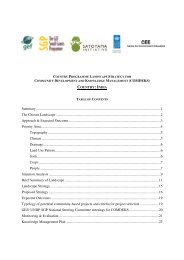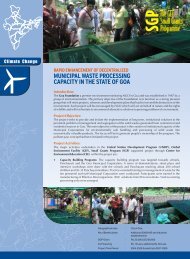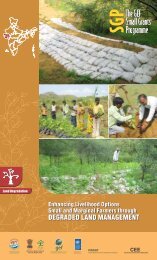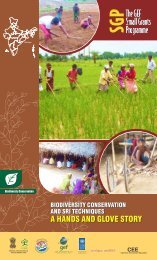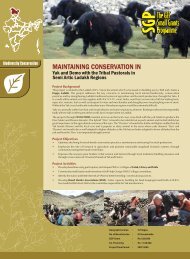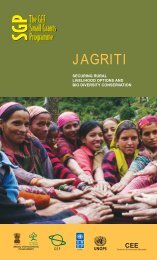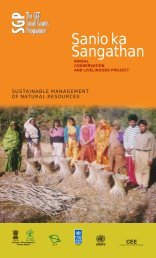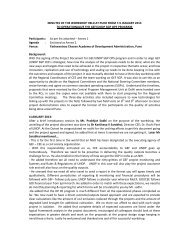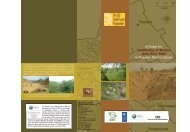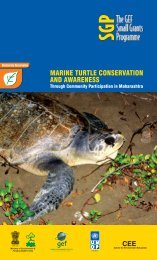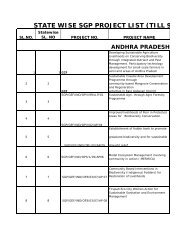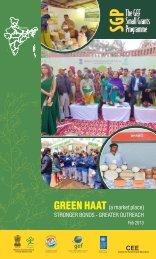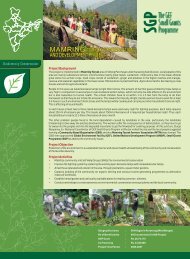Integrated Development and Tribal Livelihood
Pradeepan Folder - SGP India
Pradeepan Folder - SGP India
- No tags were found...
You also want an ePaper? Increase the reach of your titles
YUMPU automatically turns print PDFs into web optimized ePapers that Google loves.
Project Background<br />
Greater concern for addressing the rights of the<br />
marginalized women, creating sustainable<br />
livelihood options for tribals <strong>and</strong> access to<br />
social welfare schemes of the Government,<br />
Pradeepan started working in 1995 in Betul District<br />
of Madhya Pradesh.<br />
Initially to have a greater rapport <strong>and</strong> trust with<br />
locals, the NGOs activities focused more on<br />
spreading awareness among the tribal communities<br />
on education, healthcare, rights, <strong>and</strong> better<br />
governance through panchayats. During this period<br />
Samarthan NGO based in Bhopal (MP) guided<br />
Pradeepan in creating local capacities in<br />
working/empowering panchayats/local governance<br />
issues at village level.<br />
Underst<strong>and</strong>ing the need to create a sustainable future<br />
for tribals, Pradeepan widened the scope of its<br />
activities <strong>and</strong> started the process of linking<br />
panchayats <strong>and</strong> working with the poor, unreached<br />
communities living by the protected forest areas,<br />
with extremely limited resources <strong>and</strong> no options for<br />
better livelihood opportunities.<br />
Pradeepan approached GEF, UNDP Small Grants<br />
Program for linking the actions through Panchayats<br />
<strong>and</strong> Mahatma G<strong>and</strong>hi National Employment Rural<br />
Guarantee Act, (MNERGA).<br />
Pradeepan, jointly with Centre for Environment<br />
Education (CEE) developed a model for sustainable<br />
development, based on the principles of community<br />
participation <strong>and</strong> l<strong>and</strong> degradation issues. It aims to<br />
give the local communities/gram sabhas control over<br />
resources, <strong>and</strong> decisions for better food security.<br />
Name of the Organisation<br />
Pradeepan, Betul, Madhya Pradesh.<br />
Geographical Areas<br />
Forty Villages in Bhimpur Block,<br />
Distt. Betul.<br />
No. of Beneficiaries<br />
2039 Households in 40 Villages. A<br />
Population of 25,000 persons.<br />
SGP Grant ` 19,86,000<br />
Co-financing<br />
` 72,20,400<br />
Project time period<br />
February 2008-December 2012<br />
Project Partners<br />
The project was linked with Mahatma<br />
C<strong>and</strong>hi National Rural Employment<br />
Gurantee Act (MNREGA) in 15<br />
Villages; Indira G<strong>and</strong>hi Awas Yojna;<br />
Block Funds of Rural <strong>Development</strong>;<br />
Gram Sabhas of 40 Villages. Forest<br />
<strong>and</strong> Imigation Dptt. State of Madhya<br />
Pradesh (MP)<br />
Special importance <strong>and</strong> position is given to<br />
women in the program, engaging in addressing<br />
consumption, productive <strong>and</strong> strategic needs of<br />
women. Efforts have been made in building on<br />
the traditional farming methods <strong>and</strong> practices,<br />
local knowledge for sustainable agriculture,<br />
water conservation, storage of grains, fruit<br />
plantations, adoption of non-polluting<br />
cookstoves (chulhas), self employment of<br />
women, small forest produce conservation are<br />
some of the activities undertaken.<br />
The project with GEF SGP was developed with<br />
Gond tribals living in Bhimpur panchyat with<br />
a population of 2039 tribals. With the<br />
livelihoods of these Gond tribals depending<br />
completely on the forests, <strong>and</strong> no means of<br />
transportation to reach Kutanga the nearby road<br />
head, no to limited access to health, education,<br />
employment, credit, information to resources<br />
<strong>and</strong> schemes the idea deserved attention. With<br />
increasing pressure on the forests, increased<br />
dem<strong>and</strong>s for wood <strong>and</strong> fodder, encroachments<br />
on forestl<strong>and</strong> led the NGO Pradeepan to<br />
develop an integrated plan for biodiversity<br />
conservation <strong>and</strong> l<strong>and</strong> development <strong>and</strong><br />
address the issues of tribals.<br />
Project Objectives<br />
Ensure involvement of tribal communities <strong>and</strong><br />
judicious use of resources to address their<br />
livelihood <strong>and</strong> food security issues around the<br />
protected areas.<br />
Project Purpose<br />
Pradeepan, with GEF/UNDP CEE support,<br />
developed an innovative project addressing:<br />
• Empowering Gram Sabhas for better<br />
involvement of women in management<br />
<strong>and</strong> better utilization of natural <strong>and</strong><br />
financial resources.<br />
• Creation of small women kinship,<br />
common trade/area based local<br />
institutions, women led groups for benefit<br />
of tribals in environmental protection <strong>and</strong><br />
protection of local resources <strong>and</strong><br />
advocacy of the same.<br />
• Facilitation <strong>and</strong> enhancing leadership in<br />
women in managing their risks <strong>and</strong><br />
financial capital. Check violence against<br />
women, crime, dowry <strong>and</strong> AIDS.<br />
• Leveraging MNREGA, funds <strong>and</strong><br />
resources link its activities with Forest<br />
Rights Act (FRA); <strong>and</strong> Local State & District<br />
Government Plans.<br />
Project Activities <strong>and</strong> Results<br />
Following a more process <strong>and</strong> a participatory<br />
approach, led the project to document decisions on<br />
village actions at community/SHG levels; minutes<br />
of regular meetings at the village level <strong>and</strong> special<br />
trainings, skill building exercises organized by the<br />
team of NGO. Two/three volunteers were selected<br />
at village levels to facilitate the process of<br />
participation, trainings <strong>and</strong> exposure visits were<br />
organized for farmers, women <strong>and</strong> the community<br />
at large. This process approach laid the foundations<br />
in the program.<br />
• Special attention was paid to the skill<br />
enhancement of forest <strong>and</strong> environmental<br />
committees.<br />
• Campaigns organized especially for protection<br />
of forest <strong>and</strong> sustainable agriculture,<br />
encouragement of local seeds, conservation of<br />
water resources <strong>and</strong> better utilization of the same.<br />
• Skill enhancement of 40 Gram Sabhas was<br />
undertaken. 165 meetings for 1946 men <strong>and</strong><br />
1030 women were held on a range of issues;<br />
water management; rules <strong>and</strong> regulations of<br />
Gram Sabha under the GOI MNERGA. There was<br />
special focus of how women address their<br />
needs/priorities.<br />
• Skill development of women was undertaken<br />
which focused on the h<strong>and</strong>ling of forest produce,<br />
medicinal plants. Fish breeding was taken up<br />
with 200 families <strong>and</strong> in the first year a benefit of<br />
Rs.2000 each was earned by the women. 10<br />
women were able to repay their loans in one<br />
season. This activity has been scaled to benefit 30<br />
households in 2nd year.


